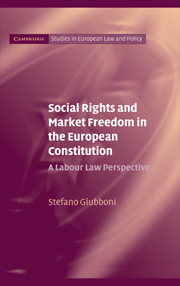Book contents
- Frontmatter
- Contents
- Series Editors' Preface
- Foreword by Professor Silvana Sciarra
- Acknowledgements
- Table of Cases
- Table of Legislation
- Introduction
- PART I Social policies and market principles. European social integration revisited
- 1 Embedded liberalism: the original constitutional compromise and its crisis
- 2 Re-embedding liberalism: towards a new balance between negative and positive integration of European welfare states
- PART II The market, competition and social rights in the European constitutional space
- Conclusions
- Index
2 - Re-embedding liberalism: towards a new balance between negative and positive integration of European welfare states
Published online by Cambridge University Press: 28 July 2009
- Frontmatter
- Contents
- Series Editors' Preface
- Foreword by Professor Silvana Sciarra
- Acknowledgements
- Table of Cases
- Table of Legislation
- Introduction
- PART I Social policies and market principles. European social integration revisited
- 1 Embedded liberalism: the original constitutional compromise and its crisis
- 2 Re-embedding liberalism: towards a new balance between negative and positive integration of European welfare states
- PART II The market, competition and social rights in the European constitutional space
- Conclusions
- Index
Summary
The difficult quest for a new balance between negative integration and positive integration of national welfare states
The weakening of the principle of territoriality of national systems of labour and social-security law as a result of the progressive expansion of the scope of the Community freedom to provide services effectively encapsulates the overall sense of the metamorphoses of the European economic constitution as described in the preceding chapter.
Negative integration came to prevail over positive integration, driven by the institutional and normative asymmetry created, in its favour, as a result of the constitutionalization of the Treaties by the Court of Justice. The latter has opted to give primary consideration to the rules underpinning the construction of a completely unified market around the principles of economic freedom, free enterprise and free competition, principles which have in this way acquired a centrality wholly unknown to the original balances. The direct effect accorded to these economic freedoms, elevated – in contrast to what had formerly been the case in most Member State constitutional traditions – to the status of fundamental rights, immediately achieved the object of removing the obstacles and barriers standing in the way of the construction of the single market, thanks to the supremacy of Community law over the rules of domestic law (including those of constitutional ranking).
The institutional limits of positive integration – as prisoner of the joint-decision trap and the political blocks of the ‘intergovernmental method’ – prevented it from adequately counterbalancing the varyingly marked deregulatory effects produced, at the level of national social policies, by the semi-automatic advance of negative integration.
- Type
- Chapter
- Information
- Social Rights and Market Freedom in the European ConstitutionA Labour Law Perspective, pp. 94 - 150Publisher: Cambridge University PressPrint publication year: 2006



